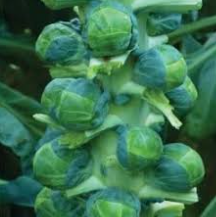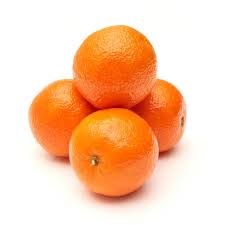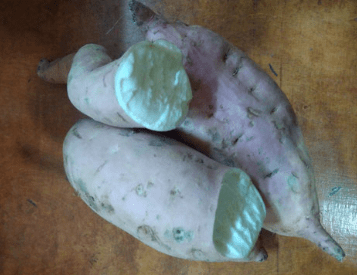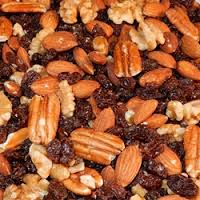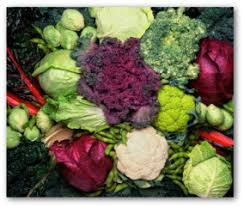What associations are brought to you by the words “delicious and happy balls”?
Some people might think of falafel balls, some, like my kids, will think of tiny, colorful chocolate balls.
For me, it is quite clear that this is the morning when the farmer comes to the store with Brussel Sprouts.
Once he brings the “tree trunks” (that's what my kids call them. And also “baseball bats” or “poles”), the first thing I do, is calculate how many I can take for myself and hide quickly.
Not that there's a danger that one of the kids will accidentally approach them, but I still find it hard to believe that none of the household members will figure it out and realize just how tasty these tiny cabbages are, so I continue to send suspicious glances at anyone approaching the refrigerator.
Like most urban legends, Brussel sprouts have a bad reputation in the kitchen unjustifiably.
It may be the result of childhood traumas of European immigrants who were forced to eat this wonder and therefor developed a negative attitude towards it, or because brussel sprouts are indeed not tasty when cooked incorrectly, really!
In fact, when I show off that I have these cute cabbages awaiting in my fridge, many people twist their noses. I argue that if you keep the basic rules, it turns out extremely tasty!
What's the secret? First – buy fresh (and organic!). Second, large cabbages can be cut a little – after separating them from the mother branch, cut in half. Third – use good quality oil to scorch them in a pan (I use butter or grape seed oil, but it can certainly come out delicious with sesame oil too – if you try, let me know).
And that's it. Usually, that is completely enough to produce a dish that is devoured even before it gets a chance to cool down.
If you like your brussel sprouts a little less crunchy and al dente, after searing it add some water to the pan, and close with the lid.
Most importantly – do not over steam them! It compromises not only the taste, but also the nutritional values. I’ll talk about those soon.
Brussel sprout, a relative of the cabbage, kohlrabi and broccoli, originating from the wild cabbage.
Like its other cruciferous relatives, it is also rich with vitamin K and vitamin C, as well as nutritional fiber and folic acid. In addition, it contains a chemical called Sulforaphane which is considered antibacterial, anti-cancer-growth and balances blood sugar levels.
This chemical is not destroyed by a short steaming, but will be destroyed by prolonged cooking.
Although its ancestors probably came from Rome, in its present form it was first observed in Brussels, in the thirteenth century, where it is a popular vegetable that is still cooked today – hence its name, “Brussels sprout” (or Chou de Bruxelles in French).
In the 16th century it was discovered by the Dutch, and from there it spread to the rest of Europe.
Brussels sprouts prefer to grow in cool weather, preferably at a temperature between 7-24 degrees, and especially in the range of 15-18 degrees.
This explains why in Israel it is grown during the winter, while in Europe it is grown in the summer. The buds, which look like a cluster of miniature cabbages growing elliptically around the stalk.
The buds ripen about 90-180 days from the moment of sowing, and the course of ripening moves from the bottom (base of the stem) to its upper end.
Varieties cultivated from selective sowing yielded interesting cultivars of Brussels sprouts – such as a purple cultivar, created from a hybrid between Brussels sprouts and purple cabbage – a cultivar created by a German farmer, which yields cute and sweet buds (inherited from their purple parent) that are, as aforesaid, purple.
Yours.
The Garden’s team
Forecast:
In the ORGANIC vegetable baskets we expect (draft only):
Cucumber
Tomatoes
Lettuce
Potatoes
Fennel
Cabbage
Swiss Chard
Parsley
The Large organic vegetable baskets also include:
Spinach
Sweet potatoe
Coriander
In the ORGANIC fruit baskets (NEW – Increased variety, price – 70 Shekels)
Oranges
Grapefruit
Banana
Clementine
Pomelo
The large ORGANIC fruit baskets also include: ( NEW – Increased variety, price -100 Shekels)
Lemon
Golden apple
Red grapefruit
The ORGANIC Green Basket:
Swiis Chard
A kind of lettuce
Kale
Dill
Green onion
Sprouts
Spinach
Celery
NEW – The ORGANIC Basket for couples or small families (price – 150 shekels):
Cucumber
Tomato
Lettuce
Potato
Eggplant
Pepper
Onion
Parsley
Swiss Chard
Sweet potatoe
Coriander
Carrot
Grapefruit
Lemon
Sweetie

